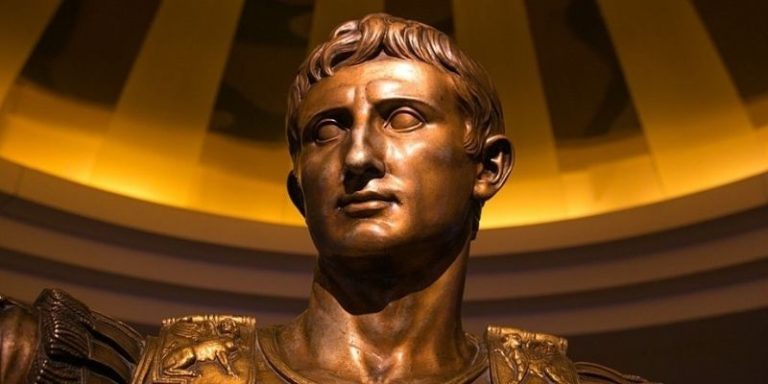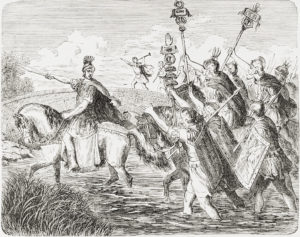This Week in History: March 13-19
Julius Caesar was killed, and St. Patrick’s Day still going strong after more than 400 years.
By: Kelli Ballard | March 13, 2022 | 910 Words

Julius Caesar (Photo by George Rose/Getty Images)
“The history of mankind is the instant between two strides taken by a traveler.” ~ Franz Kafka
March 15, 44 BC: Julius Caesar Assassinated
Roman dictator Julius Caesar has one of the most famous names in history. It was he who brought an end to the Roman Republic and began a different era in the ancient world.
Caesar made a name as a general and expanded the Roman territory in Europe, taking over parts of Gaul (modern-day western Europe, including France and Germany). He was also a powerful politician within Rome itself – but he had rivals. After his conquest of Gaul, the Roman senate ordered Caesar to step down from his military command and return to Rome. He defied the order and marched his army toward the city through Italy – which was against the law.

Julius Caesar crossing the Rubicon, 49 B.C. (Getty Images)
The group crossed the river Rubicon at the border, and at that point he committed an act of war against the Republic. That incident is where we get the phrase to “cross the Rubicon,” which means to pass the point of no return.
After a civil war, Caesar became dictator of Rome – but he again made enemies. Caesar was invited to a senate meeting on the Ides of March (March 15). He was met by a group of unhappy senators who wanted to end his reign, including one of his greatest friends, Marcus Brutus. The senators jointly stabbed him. Many of the assassins were made to inflict at least one wound so that blame could never be passed to other members of the group.
Although Caesar was a dictator, it was not completely true that he had seized power from the Roman Republic. In fact, some of the men who assassinated Caesar had appointed him “dictator for life” just a few years before.
After news of Caesar’s death became public, all of those involved fled Rome, and his grandnephew and heir, Octavius, vowed to find them. Once all the assassins had been captured or killed, Octavius declared himself emperor and took the name “Augustus.” This was the start of the Roman Empire.
March 17: St. Patrick’s Day
St. Patrick’s Day is a holiday that has been observed for centuries. The saint is the Catholic patron saint of Ireland, and the holiday is held to celebrate that country. Ironically, the first observance was recorded in America – not Ireland. According to records, the first known celebration was held on March 17, 1601, in what is now St. Augustine, Florida. It was a Spanish colony at the time, but had an Irish vicar called Richard Arthur.
Saint Patrick was born in Britain in the fifth century. When he was just 16 years old, he was kidnapped and taken to Ireland as a slave. After he escaped, he returned to Ireland to spread the word of Christianity and is credited for bringing the religion to the country.

St. Patrick’s Day Parade in New York City (Photo by Andrew Lichtenstein/Corbis via Getty Images)
Today, there are hundreds of parades and celebrations around the nation and the world, celebrating the saint.
Other Notable Mentions
March 15, 1965: President Lyndon B. Johnson urges Congress to pass a law that would guarantee voting rights for all Americans. He gave the speech days after violence had broken out in Selma, Alabama, over a planned Civil Rights march that aimed to promote voting for black Americans.
March 16, 1968: The My Lai Massacre occurred during the Vietnam War. American soldiers killed 504 Vietnamese children, women, and men. Twenty-five officers were charged, but only one was convicted, and later President Richard Nixon pardoned him.
March 16, 1968: Robert Kennedy announced his plan to run for the Democratic presidential nomination.
March 19, 2003: The US attacked Iraq to remove Saddam Hussein from power. Just 21 days later, the mission was accomplished – but the Iraq War itself continued until 2011.

Robert Kennedy (Photo by Santi Visalli/Getty Images)
Famous Birthdays
Joseph Priestly (March 13, 1733) was born in Yorkshire, England. A scientist and clergyman, he discovered oxygen as well as enhanced the theory of Unitarianism.
Albert Einstein (March 14, 1879) was born in Ulm, Germany. A physicist, he is known mostly for his Theory of Relativity which suggests that time and space aren’t fixed, but can be changed or warped. He also won a Nobel Prize in 1921.
Lucy Hobbs (March 14, 1833) was born in New York. She was the first female dentist and a women’s rights advocate.
President Andrew Jackson (March 15, 1767) was born in a log cabin in Waxhaw, South Carolina. He helped form the Democratic Party.
President James Madison (March 16, 1751) was born in Port Conway, Virginia. He helped form the Constitution and is considered the father of the important document.

President Grover Cleveland (March 18, 1837) was born in Caldwell, New Jersey. He was the only president to be married in the White House and to serve two nonconsecutive terms.
William Bradford (March 19, 1590) was born in Yorkshire, England. He sailed on the Mayflower from Plymouth, England to Massachusetts in 1620. He became the first governor of the Plymouth Colony and served for 30 years.
Wyatt Earp (March 19, 1848) was born in Monmouth, Illinois. A lawman and gunfighter in the Wild West, he is most known for the famous shootout at the O.K. Corral in 1881 with the Earp brothers facing down and beating the Ike Clanton gang.
















